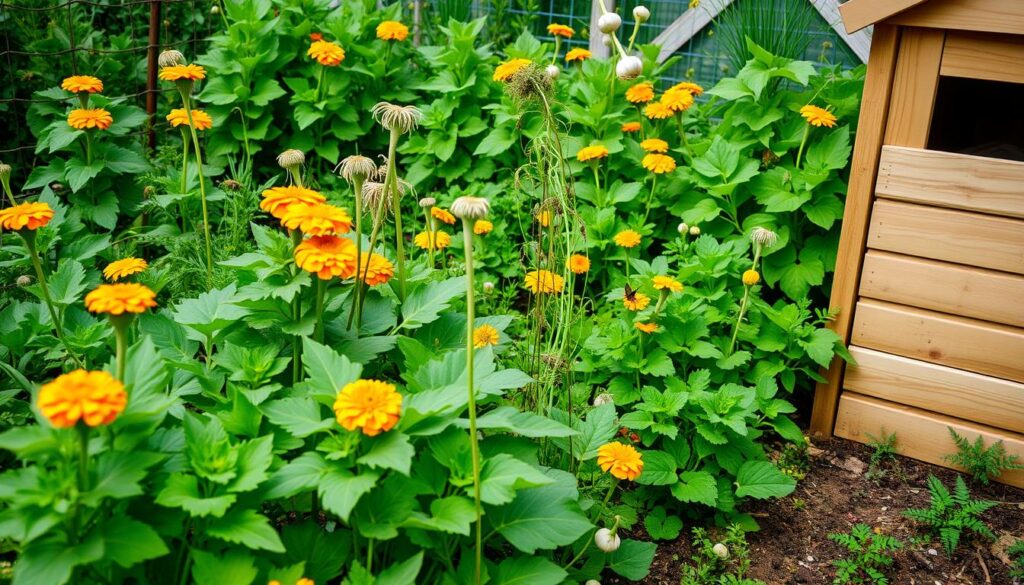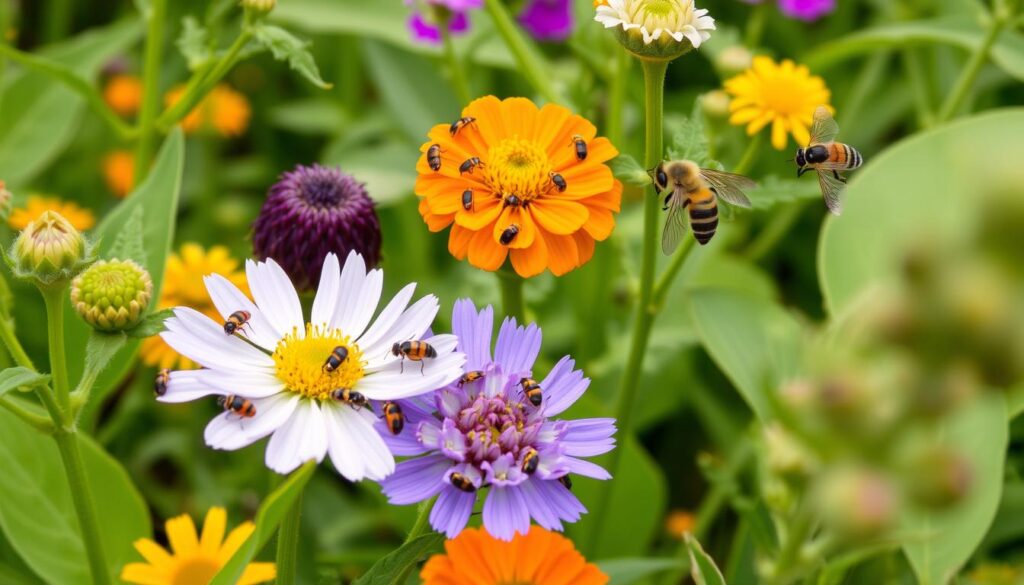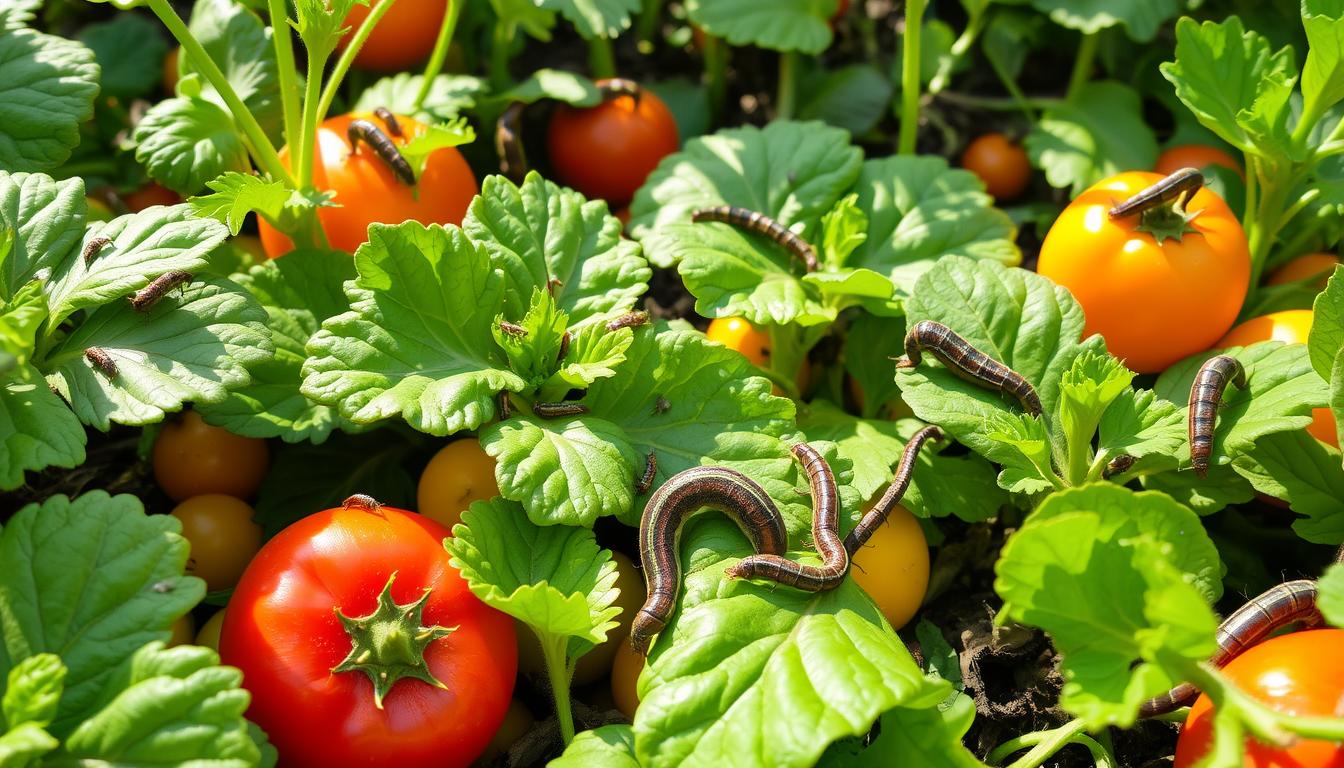As a passionate gardener, I know how frustrating pests can be. They can harm our plants, threatening our hard work. But, with the right knowledge, we can manage pests and have a great harvest. This guide will help you deal with common pests in your garden.
Whether you’re new or experienced, this article will help you protect your plants. We’ll learn about pests and use organic methods to keep them away. Let’s explore pest control together and make your garden pest-free.
Key Takeaways
- Identify common vegetable garden pests and understand their impact on plant growth and yield
- Explore organic and natural pest control methods to manage these pests effectively
- Discover the benefits of companion planting and the role of beneficial insects in pest management
- Learn about physical barriers, traps, and integrated pest management strategies for a comprehensive approach
- Implement preventative measures, such as maintaining soil health and practicing crop rotation, to create a pest-resilient garden
Understanding Common Vegetable Garden Pests
Dealing with pests in your garden can be really frustrating. These pests can harm your vegetable plants in many ways. To keep your garden healthy, it’s important to know the common pests and how they act.
Identifying Destructive Insects and Critters
Many gardeners face problems with pests like aphids, caterpillars, and beetles. Even animals like rabbits and groundhogs can be a problem. These pests damage plants by eating leaves, stems, and roots, or by digging into the soil.
The Impact of Pests on Plant Growth and Yield
Pests can really hurt your plants’ health and how much they grow. They can make plants grow slowly, reduce how much they produce, or even destroy your crops. Knowing how pests affect plants helps you find ways to control them.
“Effective pest management in the garden starts with understanding the common culprits and their impact on plant health.”
Learning about the pests in your garden helps you use better ways to control them. This way, you can have a garden that grows well and gives you lots of food.
Organic and Natural Pest Control Methods
Looking for a way to keep your garden healthy and green? Organic and natural pest control methods are a great choice. They help your plants thrive and protect the environment. Plus, they keep pests away without using harsh chemicals.
One top strategy is using beneficial insects. Ladybugs, lacewings, and praying mantises eat pests like aphids and mites. By welcoming these insects, you create a balance in your garden and cut down on chemical use.
Companion planting is another smart move. Plants like marigolds and nasturtiums keep pests away and help your veggies grow. They make your garden a diverse and strong ecosystem.
| Organic Pest Control Method | Benefits |
|---|---|
| Beneficial Insects | Natural predators that feed on common garden pests |
| Companion Planting | Certain plants act as natural repellents and provide additional benefits |
| Natural Repellents | Homemade sprays and oils made from plants like garlic, cayenne, and neem |
| Traps and Barriers | Physical barriers, such as row covers and netting, to prevent pest access |
For organic pest control, try natural repellents. Use homemade sprays and oils from plants like garlic and neem. They target pests without harming good bugs or soil.
Using traps and physical barriers is also effective. Row covers and netting keep pests out. They let light, air, and water in, but keep pests away.
By trying these natural pest management methods, you can grow a healthy and eco-friendly vegetable garden. It will be in perfect harmony with nature.

Common Pests in Vegetable Gardens and How to Control Them
Keeping a vegetable garden healthy means watching out for pests. Aphids and caterpillars are two big problems. We’ll look at these pests and how to fight them naturally.
Aphids: Tackling These Sap-Sucking Invaders
Aphids are tiny, soft insects that suck plant sap. This can make plants wilt, grow poorly, and even die. They breed fast, so they’re a big threat. But, there are ways to control them:
- Bring in helpful bugs like ladybugs, lacewings, and wasps to eat aphids.
- Use a strong water spray to wash aphids off plants.
- Try insecticidal soaps or neem oil to kill aphids without harming good bugs.
Dealing with Destructive Caterpillars
Caterpillars are the young of moths and butterflies. They eat leaves, stems, and fruits. To fight them, you need a few strategies:
- Check plants for caterpillar eggs and remove or crush them.
- Use row covers or netting to keep caterpillars away.
- Apply Bt insecticide to kill caterpillars and other leaf-eaters.
Knowing about aphids and caterpillars and using natural ways to control them can help your garden grow well.
Companion Planting: A Natural Pest Deterrent
In organic gardening, companion planting is a key strategy. It helps keep pests away and attracts beneficial insects. These insects protect the garden, making it healthy and balanced.
Beneficial Insect Allies and Their Roles
Understanding beneficial insects is crucial for companion planting. Ladybugs, lacewings, and parasitic wasps are great allies. They fight against pests in the garden.
Ladybugs eat aphids, which are pests that suck sap. Lacewings and parasitic wasps attack many pests, like caterpillars.
- Ladybugs: Devour aphids, effectively controlling these sap-sucking pests.
- Lacewings: Prey on a variety of garden pests, including aphids, mealybugs, and small caterpillars.
- Parasitic Wasps: Lay their eggs inside the bodies of caterpillars, effectively eliminating these destructive larvae.
By planting companion plants, gardeners attract these beneficial insects. This creates a balanced ecosystem. It reduces the need for harmful chemicals.

“Companion planting is a time-honored technique that can work wonders in the vegetable garden, creating a natural defense against pests while fostering a thriving, diverse ecosystem.”
Inspecting and Monitoring Your Garden
To keep your vegetable garden healthy and pest-free, you need to stay proactive. Regularly checking your garden is key to catching pests early. This way, you can stop problems before they get worse and use garden pest monitoring and preventative pest control effectively.
One crucial step is to visually inspect your plants often. Look closely at the leaves, stems, and soil around your veggies. Check for any damage, color changes, or pests. Don’t forget to check the undersides of leaves, where pests often hide.
- Look for visible pests, such as aphids, caterpillars, or beetles, that may be feeding on your plants.
- Inspect for signs of pest activity, such as chewed leaves, webbing, or frass (insect droppings).
- Closely monitor newly transplanted seedlings and young plants, as they are more vulnerable to pest infestations.
You can also use garden pest monitoring tools like pheromone traps or sticky cards. These tools can alert you to pests early, so you can act fast.
By regularly checking and monitoring your garden, you can catch pest issues early. This lets you use preventative pest control to keep your garden healthy. Stay alert, and you’ll enjoy a rich harvest without pests.
Using Physical Barriers and Traps
Physical barriers and traps are great for keeping pests out of your vegetable garden. Tools like floating row covers and netting can protect your plants. They keep insects, birds, and other critters away.
Floating Row Covers and Netting
Floating row covers are very useful. They are lightweight and let air, water, and sunlight through. This keeps pests like aphids and cabbage worms from getting to your plants.
Netting is also a great tool. It hangs over your plants to keep larger pests like birds and rabbits away. Using netting with other methods can really help protect your garden.
| Physical Pest Barrier | Key Benefits |
|---|---|
| Floating Row Covers |
|
| Netting |
|
Using physical barriers can make your garden safe and healthy. A well-protected garden grows well and gives you lots of food.
“The key to a successful vegetable garden is not just what you plant, but how you protect it.”
Integrated Pest Management Strategies
Effective pest control needs a mix of methods. The sustainable pest control approach of integrated pest management (IPM) uses different techniques. This way, you can manage pests without harsh chemicals and keep your garden healthy.
IPM starts with watching and learning about pests in your garden. You need to check your plants often, spot the pests, and know their habits. This helps you choose the right control methods for your garden.
- Cultural Control: Change how you garden to make it less welcoming for pests. This includes rotating crops, planting friends together, and keeping soil rich.
- Mechanical Control: Use barriers like row covers or nets to keep pests away. You can also catch pests by hand in small gardens.
- Biological Control: Bring in natural helpers like ladybugs or lacewings. They eat pests and help keep your garden balanced.
- Organic Pesticides: If needed, use organic pest control products. They’re safer for the environment and good for beneficial insects.
Using a multi-faceted pest control plan helps your garden stay healthy. It keeps pests under control and makes your garden strong.
“The key to successful pest control is not the elimination of all pests, but rather the management of their populations to an acceptable level.” – IPM Expert, John Doe
Preventative Measures for a Pest-Free Garden
Stopping pests before they start is often the best strategy. By being proactive, you can make your garden less appealing to pests. This greatly lowers the chance of problems in your vegetable garden.
Soil Health and Crop Rotation
Healthy, nutrient-rich soil is key to preventing pests. Soil that supports strong, vibrant plants is less likely to attract pests. A regular crop rotation schedule also boosts soil health.
By rotating your crops, you make it harder for pests to find a home. This breaks the patterns pests rely on. Adding organic matter like compost or mulch improves soil structure and fertility. It helps plants grow stronger against pests.



Leave a Reply